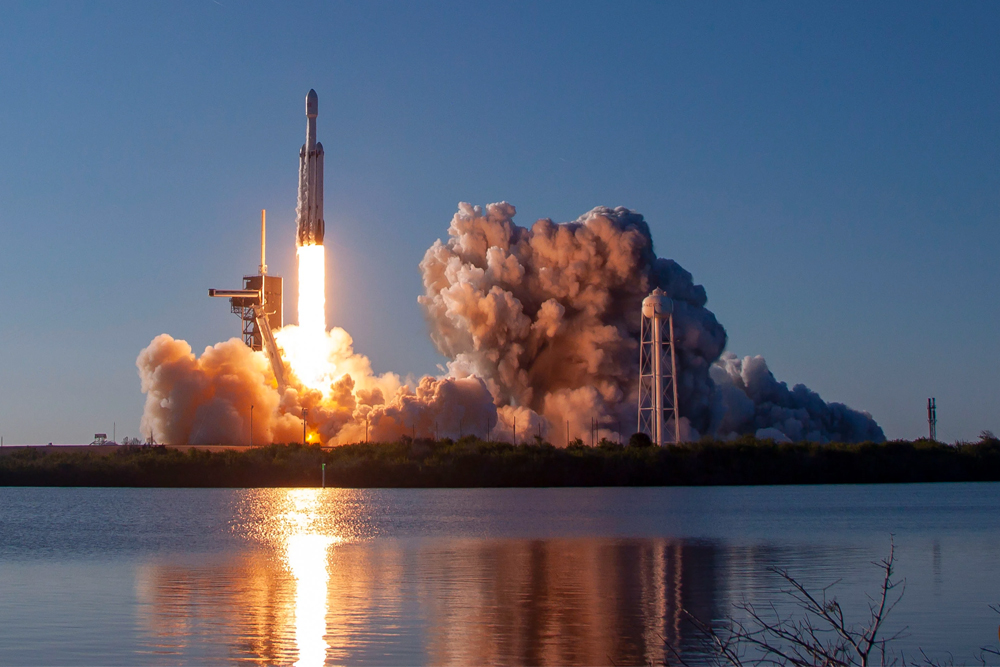
The King Abdulaziz City for Science and Technology (KACST) announced that Saudi Arabia had successfully launched two satellites – Shaheen Sat and CubeSat – from Baikonur Base, in Kazakhstan. This was made possible by using the Russian Soyuz 2 rocket, which launched a total of 38 satellites, from 18 nations, into orbit.
The Shaheen Sat satellite was engineered by a team of specialists working with KACST. Its main purpose is to take images of Earth that will be provided to the private sector and the government, along with monitoring shipping vessels by using artificial intelligence and data processing. Shaheen Sat is said to weigh 75 kilograms and have a dimension of 56 x 56 x 97 centimeters.
Saudi “#ShaheenSat” launched today aboard the Russian Soyuz rocket, the sat designed and made in Saudi Arabia, will be used for photography and maritime tracking purposes. #شاهين_سات #القمر_السعودي17 pic.twitter.com/QucBA1T33N
— Fadila Al Jaffal (@FadilaAlJaffal) March 22, 2021
In a statement made to Saudi Press Agency (SPA), KACST's President Dr. Anas bin Faris Al-Faris expressed that the launch of Shaheen Sat was made possible due to support provided to research, development, and innovation in the kingdom. In addition, he stated that KACST will be working closely with the Saudi Space Commission in investing in technology, and efficiently manufacturing satellites in a short period of time. In a separate statement, the CEO of the Saudi Space Commission, Dr. Abdulaziz bin Mohammed Al Al-Sheikh, expressed his happiness with the step taken by KACST in the successful launch of Shaheen Sat.
The other satellite, CubeSat, was engineered by King Saud University (KSU), and is said to weigh just 1 kilogram and have a dimension of 10 x 10 x 10 centimeters. In general, CubeSats are roughly the size of a Rubik's Cube and can either be used for taking high resolution images of Earth, studying magnetic fields, or surveying wildlife. Saudi Arabia’s CubeSat was manufactured through the combined efforts of 130 students of the university's College of Engineering department, and its successful launch makes KSU the first Saudi Arabian university to dabble in the scientific field of space.
King Saud University is the first Saudi university launching a CubeSat satellite with a size of 10 x 10 x 10 cm, weighing 1 kg, and it has a ground station that can communicate with small and large satellites as well as the International Space Station. #SPAGOV pic.twitter.com/Y9auSbrkrV
— SPAENG (@Spa_Eng) March 19, 2021
Rector of King Saud University (KSU), Dr. Badran Bin Abdulrahman Al-Omar, expressed his happiness over the successful launch of the CubeSat, and gave his gratitude to His Majesty King Salman, and Crown Prince Mohammad bin Salman for their support in Saudi education and research. Dr. Al-Omar had also expressed his desire to launch a larger CubeSat, with locally produced parts based on knowledge gained from KSU's recent endeavor.
In 2019, Saudi Arabia took a big leap into space exploration, signing a pan-Arab agreement with 10 countries in the region to make a regional space agency a reality. Now, with the successful launch of both Shaheen Sat and CubeSat, which comes as part of recent efforts by Saudi Arabia to localize space technology in line with its Vision 2030 goals, we should expect the country to take further steps in space research in the near future.

















